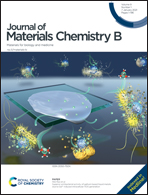A soft anti-virulence liposome realizing the explosive release of antibiotics at an infectious site to improve antimicrobial therapy†
Abstract
Pore-forming toxins (PFTs), the most common virulence proteins, are promising therapeutic keys in bacterial infections. CAL02, consisting of sphingomyelin (Sm) and containing a maximum ratio of cholesterol (Ch), has been applied to sequester PFTs. However, Sm, a saturated phospholipid, leads to structural rigidity of the liposome, which does not benefit PFT combination. Therefore, in order to decrease the membrane rigidity and improve the fluidity of liposomes, we have introduced an unsaturated phospholipid, phosphatidylcholine (Pc), to the saturated Sm. In this report, a soft nanoliposome (called CSPL), composed of Ch, Sm and Pc, was artificially prepared. In order to further improve its antibacterial effect, vancomycin (Van) was loaded into the hydrophilic core of CSPL, where Van can be released radically at the infectious site through transmembrane pores formed by the PFTs in CSPL. This soft Van@CSPL nanoliposome with detoxification/drug release was able to inhibit the possibility of antibiotic resistance and could play a better role in treating severe invasive infections in mice.



 Please wait while we load your content...
Please wait while we load your content...